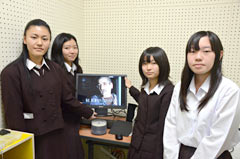“It was discrimination that Okinawan people struggled against”
Misato High School broadcasting club completes a documentary on the Koza Riot

Misato High School broadcasting club (from the left) Yuumi Yagi, Sato Yamakawa, Akane Ashitomi, and Rena Maekado, who produced a documentary film focusing on the U.S. military issue in Okinawa through the Koza Riot.
December 21, 2011 Ryukyu Shimpo
On December 19, Misato High School broadcasting club completed a documentary film entitled Koza ga moeta hi (The day Koza burned), which was produced to commemorate the 40th anniversary last year of the Koza Riot. Additional interviews and some revisions were included in the final version. The film contains not only testimony from those involved, but also covers residents’ efforts to establishment the background to the event and comments from military police who faced off against the angry crowd. Chatan Town, where economic development has been achieved after land used by a U.S. base was returned, appears on the film in order to appeal to people break away from dependence on a base-related economy. The film covers the various dimensions of the issue of the U.S. military presence in Okinawa.
The documentary received an incentive award in the NHK Inter High School Broadcasting Contest in July.
Second grade students Akane Ashitomi and Yuumi Yagi of the Misato High School broadcasting club commented that they were impressed that Okinawan people did nothing towards African-Americans, who were discriminated in the United States, and that women also participated in the riot.
“I think it was discrimination that Okinawan people fought against in the Koza Riot,” said third grade student Sato Yamakawa.
Second grade student Rena Maekado said, “Even today when incidents involving U.S. military personnel occur, Okinawan people have to clamor for them to be handled properly, so the situation now is basically unchanged.”
(English translation by T&CT, Shinako Oyakawa and Mark Ealey)
Previous Article:Naha Airport ranks 5th in the country in terms of annual passenger numbers
Next Article:Ministry of Defense allocates one billion yen for the deployment of Self-Defense Forces to Yonaguni Island
[Similar Articles]
- “We hope to let people know about the Okinawa reversion movement,” ― Hentona High School Students make a film
- Himeyuri screened in Germany: 180 people view the documentary in Japanese school
- Photographers discuss significance of Koza riot
- “I understood how both the Uchinanchu and U.S. military felt.” Okinawan musician who grew up down the street from military base shares his story on the 49th anniversary of the Koza Riot
- “Okinawa’s struggle on the edge of non-violence” discussed at Naha symposium 50 years after Koza riot, links to the present explored
 Webcam(Kokusai Street)
Webcam(Kokusai Street)


